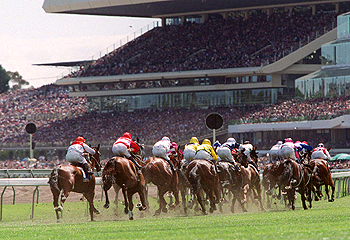The Early Years of the Melbourne Cup 18
 Although now known universally as “the race that stops the nation” the very first Melbourne Cup was raced at Flemington Park in November 1861 and was an absolute spectacle which saw one horse bolt before the start and three fall during the two mile race, two of which had to be put down. That first race was eventually won by a horse from Melbourne’s rival city of Sydney named Archer an unfancied outsider. He had allegedly walked from Sydney to contest the race but whether he had or hadn’t became academic as he romped home by six lengths from the Victorian bred favourite and champion Mormon. That win by an ‘outsider’ fuelled the interstate rivalry that helped to develop the popularity that the race still holds to this day in Australia. The win earned Archer’s connections the equivalent to $1,000 AU.
Although now known universally as “the race that stops the nation” the very first Melbourne Cup was raced at Flemington Park in November 1861 and was an absolute spectacle which saw one horse bolt before the start and three fall during the two mile race, two of which had to be put down. That first race was eventually won by a horse from Melbourne’s rival city of Sydney named Archer an unfancied outsider. He had allegedly walked from Sydney to contest the race but whether he had or hadn’t became academic as he romped home by six lengths from the Victorian bred favourite and champion Mormon. That win by an ‘outsider’ fuelled the interstate rivalry that helped to develop the popularity that the race still holds to this day in Australia. The win earned Archer’s connections the equivalent to $1,000 AU.
Somewhat amazingly, the New South Wales bred Archer was entered into the Melbourne Plate the following day and won that two mile event too taking back to Sydney another good sized purse.
Mormon returned to Flemington 12 months later, this time with an eight length success a winning distance that has never been bettered since. The unfortunate Mormon had to content himself once again by finishing in second place. Archer’s entry was the reason why the crowd had doubled in size that year with plenty of home supporters hoping to see him beaten but wasn’t to be the case and the result consigned his name into Melbourne Cup folklore.
Unfortunately, that was to be Archer’s last run in the increasingly popular race. It had been hoped that he would turn up in 1863 but due to the fact that his entry for the race arrived during a Victoria State Public Holiday he was never entered and despite protests by his connections, he was subsequently scratched.
The withdrawal of Archer caused much consternation for both Victorians and those from New South Wales and in a show of support for Archer’s trainer, Etienne de Mestre, plenty of owners withdrew their entries from the race, leaving just a field of seven runners. It would have been a minor miracle however if Archer had won the race for a third time as he would have been carrying 11st 4Ib over a stone more than the next highest in the handicap.
De Mestre also became a name synonymous with the Melbourne Cup, before retiring he trained three further winners of the race, Tim Whiffler in 1867, Chester in 1877 and Calamia in 1878.
The victory by ‘Tim Whiffler’ was particularly amusing as he was one of two horses that had turned up for the race with that name. They had received the names courtesy of a verse in a poem written by Adam Lindsay Gordon in 1865 where he predicted that a horse called Tim Whiffler would win the Melbourne Cup. The stewards and the connections agreed that they both needed to have their names tweaked, so for the purpose of the race, the De Mestre entry was called “Sydney Tim Whiffler”, while the other, which was bred in Melbourne was called “Melbourne Tim Whiffler”. The crowd of course thought this was a great idea but only until the ‘Sydney’ version got up to win!
The Melbourne Cup ahs gone on from strength to strength since those early days and is now the number one horse racing in Australia attracting a crowd of over 100,000. The 2011 Melbourne Cup takes place on 1st November.



